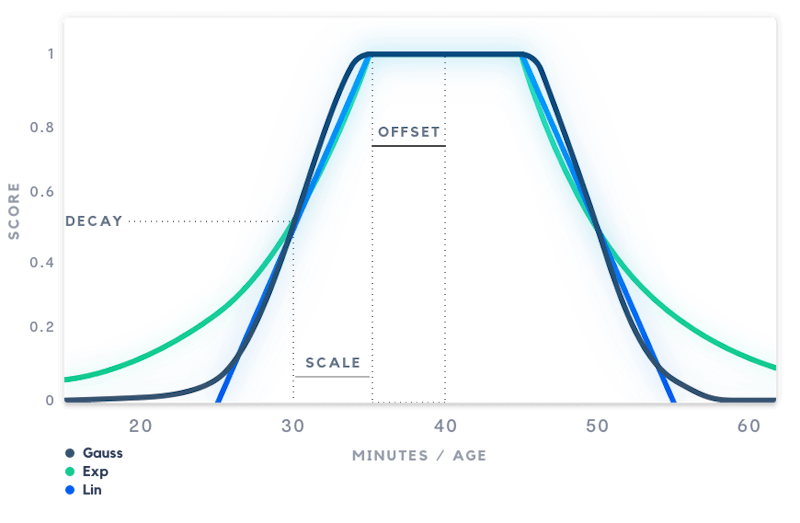Custom Ranking
Confused about "Custom Ranking"?
Let us know how we can improve our documentation:
Stream allows you to configure your own ranking method. You can add multiple ranking methods to a given Flat feed group.
An example ranking config is shown below:
Available Functions
Copied!Confused about "Available Functions"?
Let us know how we can improve our documentation:
name | description |
|---|---|
Basic Arithmetic | The following are supported: + - * / ( ) ^ |
ln(x) | Log Function natural base |
log(x) | Log Function base 10 |
sin(x) | Trigonometric sine function |
cos(x) | Trigonometric cosine function |
tan(x) | Trigonometric tangent function |
abs(x) | Absolute value |
min(a,b) | Minimum value |
max(a,b) | Maximum value |
trunc(x) | Truncates to the nearest integer value |
round(x) | Rounds to the nearest integer value |
decay_linear(t) | Linear Decay |
decay_exp(t) | Exponential Decay |
decay_gauss(t) | Gauss Decay |
rand_normal() | Returns a normally distributed number in the range [-inf, +inf] with standard normal distribution (stddev = 1, mean = 0) |
rand_normal(a,b,σ,µ) | Returns a normally distributed number in the range [a, b] with specific normal distribution (stddev = σ, mean = µ) |
rand() | Returns a random number in the range [0, 1.0) |
rand(a,b) | Returns a random number in the range [a, b) |
to_unix_timestamp(t) | Converts a time value to a unix timestamp |
dist(lat1,lng1,lat2,lng2,unit) | Returns the distance between the two points given by |
Operators
Copied!Confused about "Operators"?
Let us know how we can improve our documentation:
The scoring algorithm has support for simple control flows and logical operators.
Logical operators
&&and||Ternary conditional
x ? y : zControl order of evaluation with parens
()
This lets you construct a scoring algorithm like this
Adding Activities
Copied!Confused about "Adding Activities"?
Let us know how we can improve our documentation:
Below is an example of how to add activities with custom ranking:
Retrieving Activities
Copied!Confused about "Retrieving Activities"?
Let us know how we can improve our documentation:
Below is an example of how to retrieve activities sorted by custom ranking:
Configuring ranking can be complex. Feel free to reach out to support if you have questions.
More visibility into ranking variables
Copied!Confused about "More visibility into ranking variables"?
Let us know how we can improve our documentation:
If you need to inspect your ranking variables at runtime this can be achieved like so
Decay & Ranking
Copied!Confused about "Decay & Ranking"?
Let us know how we can improve our documentation:
Stream supports a Linear, Exponential, and Gauss decay. For each decay function, we support 4 arguments: Origin, Scale, Offset, and Decay. You can pass either a timedelta string (such as 3d, 4w), or a numeric value.

Parameters
Copied!Confused about "Parameters"?
Let us know how we can improve our documentation:
name | description | default |
|---|---|---|
origin | The best possible value. If the value is equal to the origin the decay function will return 1. | now |
scale | Determines how quickly the score drops from 1.0 to the decay value. If the scale is set to "3d" the score will be equal to the decay value after 3 days. | 5d |
offset | Values below the offset will start to receive a lower score. | 0 |
decay | The score that a value at scale distance from the origin should receive. | 0.5 |
direction | left, right or both. If right is specified only apply the decay for the right part of the graph. | both |
The example below defines a simple_gauss with the following params:
scale: 5 days
offset: 1 day
decay: 0.3 day
This means that an activity younger than 1 day (the offset) will return a score of 1. An activity that is exactly 6 days old (offset + scale) will get a score of 0.3 (the decay factor). The full JSON config is shown below:
You can specify defaults for the variables you use. The example above sets popularity to 1 if it's missing from the activity. We highly recommend setting up defaults to prevent errors when retrieving activities without these variables.
Configuring ranking can be complex. Feel free to reach out to support if you have questions!
Analytics & Reaction Counts
Copied!Confused about "Analytics & Reaction Counts"?
Let us know how we can improve our documentation:
In this example, we define defaults for activities that might be missing any analytics or reactions on it. Then, a linear combination of these numbers is adjusted according to passed time.
